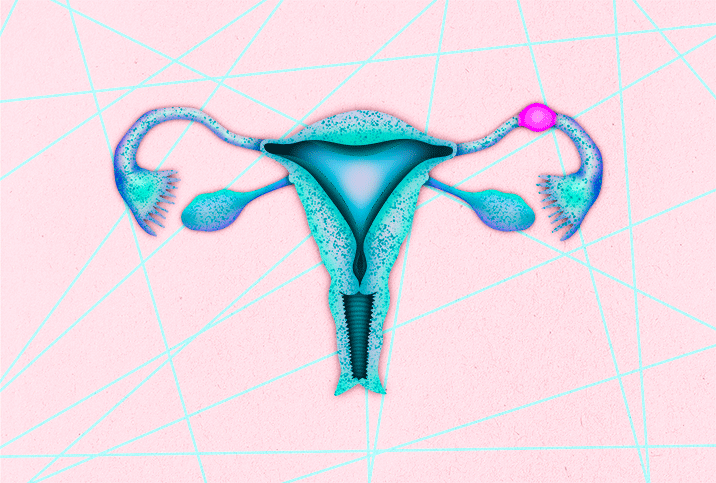Cryptic Pregnancy: What to Expect When You're Not Expecting

Many people are familiar with the supposed telltale signs of early pregnancy, such as a missed period, breast tenderness and fatigue. However, these symptoms can also be indicative of other health conditions. As a result, people with a mild first trimester may not even consider pregnancy as a possibility, and then find themselves completely surprised by fetal movement—or even birth—down the road.
"There are a lot of reasons someone may not know they are pregnant," said Holly Yeager, a doula and owner of Lancaster Doulas in Pennsylvania. "This is called cryptic pregnancy. You could miss the signs of early pregnancy, such as tender breasts, tiredness, missing periods and heartburn."
For people who aren't trying to conceive, whether they are using prevention or have a health condition that makes conception unlikely, the possibility of pregnancy might not even be on their radar. Let's take a look at the reasons people sometimes miss it.
Conditions pregnancy symptoms can mimic
The ironic thing about pregnancy is that the earliest signs can directly mimic menstruation. Cramping, fatigue and even some bleeding are all symptoms that can occur at the beginning of a pregnancy.
"You could mistake pregnancy signs for signs your period is coming," Yeager said. "Couple this with implantation bleeding and you could think you're having a light period."
Implantation bleeding is the light spotting that normally occurs about two weeks after conception. Since two weeks is also about how much time it takes to have a period after ovulation in a regular cycle, it makes sense that this bleeding could be mistaken for a period, especially in those who typically have lighter periods.
Furthermore, a late, missed or unusually light/heavy period may not sound any alarms for those who typically have irregular periods anyway due to conditions such as PCOS.
'You could mistake pregnancy signs for signs your period is coming.'
A host of gastrointestinal issues can be mimicked by pregnancy as well. For example, it makes sense how morning sickness—especially for those whose morning sickness isn't confined to the mornings—can be written off as a stomach bug or food poisoning.
"Simple gas and indigestion can feel like fetal movement," said Nicole Kaplan, a comprehensive sexuality educator in Indiana.
Additionally, pregnancy hormone levels vary from person to person. Someone with lower levels of pregnancy hormones may simply have mild symptoms early on in pregnancy, if any at all.
"Low levels of pregnancy hormones can make your symptoms very mild, as well as cause slight bleeding that could mislead you into thinking you're having a regular period," Yeager said. "The first trimester usually shows signs of pregnancy such as tender breasts and tiredness, and then the second trimester is usually symptom-free, which can cause further delay in noticing a pregnancy."
Who can experience cryptic pregnancy
Cryptic pregnancy occurs in approximately 1 out of every 475 pregnancies at 20 weeks gestation, and 1 out of every 2,500 pregnancies that reach active labor. So, it's more common than you'd think, and people of various demographics can be affected.
"I would say the less aware you are of your own body, of how pregnancy works or how the reproductive system works, the more likely cryptic pregnancy is, which tends to happen to our younger demographics like teens or young adults," said Kaylee Proctor, a birth and postpartum doula, newborn care specialist and pediatric sleep consultant at Little Apple Doulas in Manhattan, Kansas. "On the flip side, you may be older and think you're beyond the point of being able to get pregnant."
However, the research into denied pregnancy has found conflicting results. A 2007 German retrospective study of 61 patients found they were mostly in school or employed, over the age of 18 and had a high school diploma. This finding was at odds with conventional thinking at the time. Meanwhile, a 2021 French case-control study of 71 participants found that women with pregnancy denial were young, less likely to have a high school diploma and had a precarious socioeconomic status.
'I would say the less aware you are of your own body, of how pregnancy works or how the reproductive system works, the more likely cryptic pregnancy is.'
Low socioeconomic status often prevents people from seeking medical care, and if you don't think you could be pregnant, you may write your symptoms off as benign concerns that don't require the time and expense of a doctor's visit.
"People who don't have expendable income for doctor visits might choose to just cope with whatever symptoms, if any, that they are dealing with because they can't afford to take time off work to see a doctor or they worry they won't be able to afford their copay just to have an appointment," Kaplan agreed.
Racism may also be a factor. Studies on racial bias have shown Black people are more likely to have their health concerns diminished, which could result in a pregnant Black person forgoing medical care for pregnancy symptoms.
"Black women are historically written off for their ailments, so this would be yet another demographic that might not bother going to the doctor for a symptom they feel is tolerable," Kaplan said.
Pregnancy symptoms to look out for
Even though pregnancy symptoms can be disguised as a plethora of other conditions, there are some things you can look out for to help you determine when it's time to take a test.
"Specific signs of pregnancy that I would watch for definitely include cycle changes," Proctor said. "So, I know it's not everyone's experience to have a regular cycle every month, but if you usually have a regular cycle and you are noticing that you are late, or you have realized you missed a period and you're also experiencing things like nausea and extreme fatigue, you may be pregnant. Also, if you're far enough along, you may notice a change in the shape of your abdomen or the area between your belly button and your pubis."
All of the professionals I spoke with agree that cycle changes are important to pay attention to.
"Being aware of one's menstrual cycle can be one of the most helpful ways to anticipate and understand whether or not a person might be pregnant," Kaplan said. "However, not everyone with a uterus has a predictable cycle. This is one of the reasons that doctors so often require pregnancy tests before examining other health conditions."
On that note, the best way to know for sure is to take a pregnancy test, and doing so doesn't necessarily require an expensive doctor's office visit.
"Since pregnancy symptoms are so varied and the degrees of experience are varied as well, it is impossible to point out a specific 'sign,'" Yeager said. "However, if there is any drastic change in your cycle, unexplained weight gain or you just want to be 100 percent sure, you can take a Dollar General test. They are the exact same ones used at the doctor's office and a fraction of the cost of the fancy name-brand pregnancy tests."


















